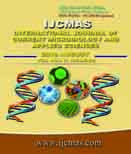


 National Academy of Agricultural Sciences (NAAS)
National Academy of Agricultural Sciences (NAAS)

|
PRINT ISSN : 2319-7692
Online ISSN : 2319-7706 Issues : 12 per year Publisher : Excellent Publishers Email : editorijcmas@gmail.com / submit@ijcmas.com Editor-in-chief: Dr.M.Prakash Index Copernicus ICV 2018: 95.39 NAAS RATING 2020: 5.38 |
In general, the compounds needed to improve the formation of hair roots are the growth hormone Indol Acetic Acid (IAA), this hormone is in addition produced by Plant Growth-Promoting Rhizobacteria (PGPR). These bacteria, although applied at the root, are also capable of improving other parts of the plant to produce toxic compounds for pests and diseases, so plants resistant to pests, the bacteria are also called Systemic Acquired Resistance (SAR) bacteria or Induced Systemic Resistance to pests From the results of this research, it was found that the Phosphate Solubilizing Rhizobacterium, that have been formulated in the form of biofertilizer formulation of, Active Sand Formulation, and Compost Formulation, able to improve plant growth in the form of plant height, number of leaves and number of branches and Yield compared to control. Liquid and flour formulations, however, generally very low stimulating plant growth. The kind of Phosphate Solubilizing Rhizobacterium capable to improve the growth and yield of peanut plants are Serratia marcescens, Enterobacter cloaceae and Achromobacter spanius. Peanut crops that are applied with Biofertilizer Phosphate Solubilizing Rhizobacterium, less able to protect the plant from the infection of leafspot (Cercospora arachidicola), leaf spots (Alternaria arachidis) and leaf blight (Leptosphaerulina crassiasca). Peanut crops that are applied with biofertilizer Phosphate Solubilizing Rhizobacterium, able to protect peanut plants from rust disease (Puccinia arachidis). The best formulation biofertilizer of Phosphate Solubilizing Rhizobacterium is an Active Sand formulation.
 |
 |
 |
 |
 |